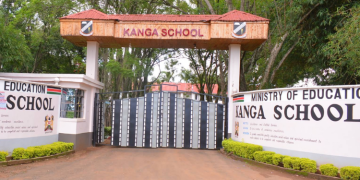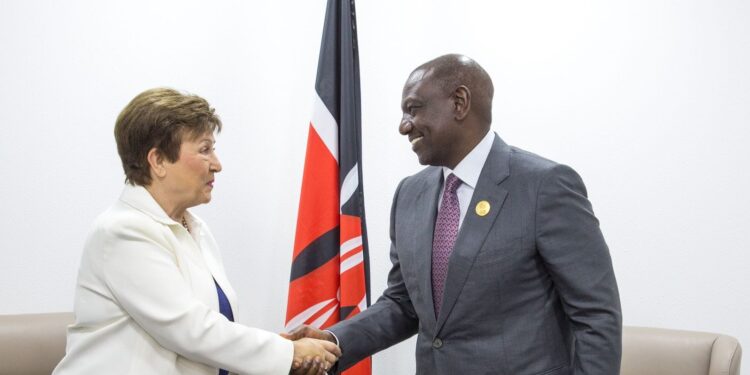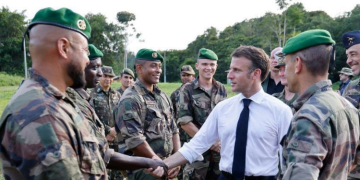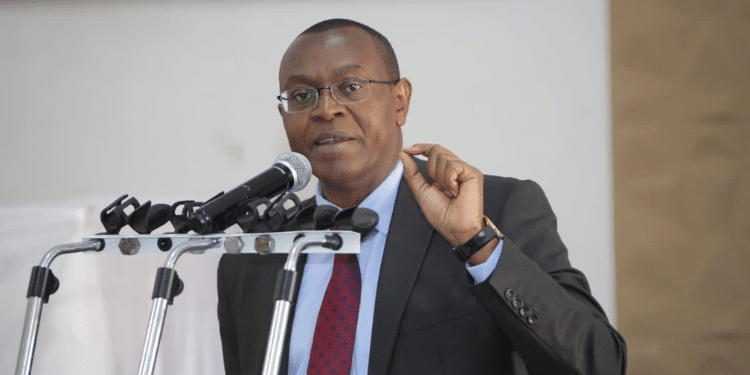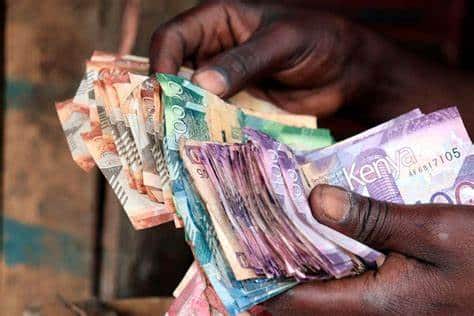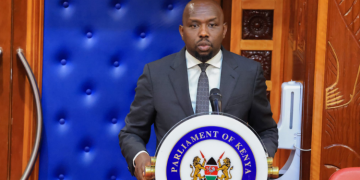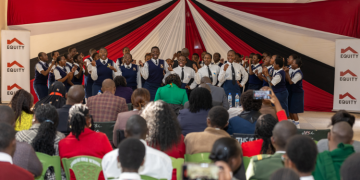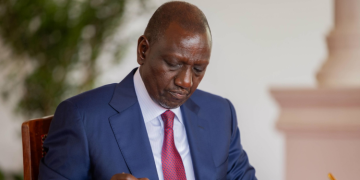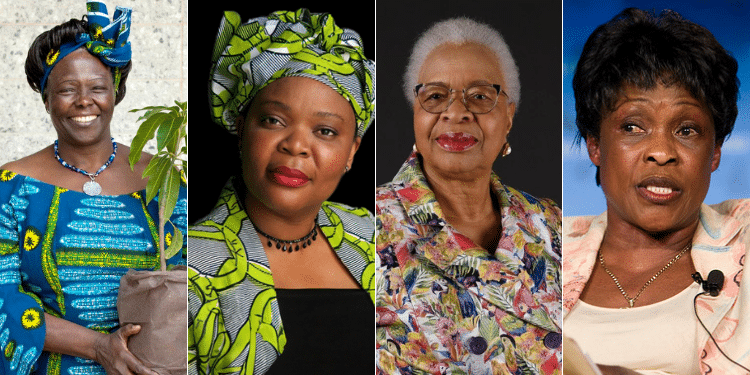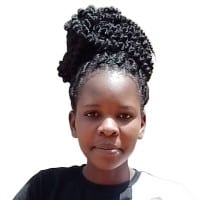Women leaders at both African and local levels, including figures like the late Wangari Maathai, have been instrumental in de-escalating conflicts, preventing violence, and promoting inclusive peace in various peace operations.
They have actively contributed to conflict prevention, resolution, peace negotiations, peacebuilding, peacekeeping, humanitarian response, and post-conflict reconstruction.
Their involvement has highlighted the importance of equal participation and full inclusion in all efforts to maintain and promote peace and security.
According to Prime Cabinet Secretary Musalia Mudavadi, existing data shows that women have been included in only 13 percent of peace negotiation teams. However, when women participate, the likelihood of reaching a peace agreement increases by 35 percent.
Once a peace agreement is reached; A study by the Council on Foreign Relations found that peace agreements are 64 percent less likely to fail if women are part of the negotiation process.
The Kenya Times looks at four profound African women leaders who have championed the space of women in peace and security.

4 African Women Trailblazers in Championing Peace and Security
Wangari Maathai (Kenya)
The late Wangari Maathai was the first African woman to receive the Nobel Peace Prize in 2004. She was an environmentalist and activist whose work with the Green Belt Movement emphasized sustainable development, women’s rights, and peace.
The Norwegian Nobel Committee awarded the 2004 Nobel Peace Prize to Wangari Maathai for her significant contributions to sustainable development, democracy, and peace.
Wangari Maathai recognized the link between peace and environmental preservation and led efforts to promote ecologically sustainable social, economic, and cultural development in Kenya and across Africa.
Her holistic approach connected environmental conservation with democracy and women’s rights. She courageously stood against Daniel Arap Moi’s oppressive regime, and her actions drew global attention to political oppression and inspired many, particularly women, to improve their situations and fight for democratic rights.
Additionally, in 1977, Wangari Maathai initiated a grassroots movement to combat deforestation, which was threatening the livelihoods of agricultural communities.
The campaign encouraged women to plant trees in their local areas and foster ecological awareness. Known as the Green Belt Movement, it expanded to other African nations and resulted in the planting of over thirty million trees.
Also Read: Why Women in Africa Need Higher Education Empowerment
Maathai’s efforts went beyond environmental conservation, encompassing sustainable development, democracy, women’s rights, and global solidarity. As the Nobel Committee noted, “She thinks globally and acts locally.”
She subsequently earned a Master of Science degree from the University of Pittsburgh (1966). She pursued doctoral studies in Germany and the University of Nairobi, obtaining a Ph.D. (1971) from the University of Nairobi where she also taught veterinary anatomy.
Wangari Maathai was active in the National Council of Women of Kenya in 1976-87 and was its chairman in 1981-87.
It was while she served in the National Council of Women that she introduced the idea of planting trees with the people in 1976 and continued to develop it into a broad-based, grassroots organization whose main focus is the planting of trees with women groups in order to conserve the environment and improve their quality of life.
Leymah Gbowee (Liberia)
Gbowee is a Nobel Peace Prize laureate, renowned for her role in leading a women’s movement that helped bring an end to the Liberian civil war in 2003. She organized women across religious and ethnic lines to advocate for peace.
Leymah was best known for leading a nonviolent movement that brought together Christian and Muslim women to play a pivotal role in ending Liberia’s devastating, fourteen-year civil war in 2003.
This historic achievement paved the way for the election of Africa’s first female head of state, Liberian President Ellen Johnson Sirleaf. It also marked the vanguard of a new wave of women emerging worldwide as essential and uniquely effective participants in brokering lasting peace and security.
Leymah Gbowee, who was just 17 when the civil war began, became a young mother and trained as a social worker and trauma counselor, motivating her to advocate for peace and women’s rights.
She co-founded the Women in Peacebuilding Network (WIPNET) and organized the Women of Liberia Mass Action for Peace, where she led thousands of women in public protests, ultimately pressuring then-President Charles Taylor to engage in peace talks.
Leymah then collaborated with a Muslim partner to form a groundbreaking coalition with Muslim women, leading to the creation of the interfaith movement known as the Women of Liberia Mass Action for Peace, which operated under the auspices of WIPNET.
She was appointed spokesperson for the Women of Liberia Mass Action for Peace and led weeks-long public protests that garnered thousands of participants. These protests compelled Liberia’s then-President Charles Taylor to meet with the women and agree to participate in formal peace talks held in Accra, Ghana.
She also co-founded the Women Peace and Security Network Africa (WIPSEN-A) and established the Gbowee Peace Foundation Africa (GPFA) in 2012 to provide educational and leadership opportunities for women, girls, and youth.
Gbowee served on the Board of Directors of the Nobel Women’s Initiative, Gbowee Peace Foundation, and the PeaceJam Foundation, and she is a member of the African Women Leaders Network for Reproductive Health and Family Planning.
In 2013, she was named a Distinguished Fellow in Social Justice, a Visiting Transnational Fellow at the Center for Research on Women, and Fellow in Residence at the Athena Center for Leadership Studies at Barnard College.
She holds a master’s degree in Conflict Transformation and has received several honorary degrees.

Also Read: 7 Women CEOs Leading Companies in Kenya
Graça Machel (Mozambique)
Machel is a prominent advocate for women’s and children’s rights, Machel has worked on various peace initiatives in Africa and served as a member of the Africa Union’s Panel of the Wise, which advises on conflict resolution.
Graça Machel is an African stateswoman whose decades-long professional and public life is rooted in Mozambique’s struggle for self-rule and international advocacy for women’s and children’s rights.
She is a former freedom fighter in Mozambique’s FRELIMO movement and that country’s first Minister of Education.
In the years following her tenure in government, Machel produced a ground-breaking UNICEF report “The Impact of Armed Conflict on Children” that changed the way the United Nations and member states respond in conflict zones.
Since then, she has worked tirelessly in support of global health, child welfare, and women’s rights and empowerment.
Machel works through several regional and international development bodies to accelerate social transformation. Machel is a founding member and Deputy Chair of The Elders and played a key role in establishing Girls Not Brides.
Nelson Mandela, Desmond Tutu, Jimmy Carter, and Kofi Annan were also members of the Elders who supported human rights all over the world.
She is a member of the UN Secretary-General’s Sustainable Development Goals Advocacy Group and sits on the High-Level Steering Group for Every Woman Every Child.
She founded and served as President of the Foundation for Community Development and the Zizile Institute for Child Development.
Machel founded the Graça Machel Trust in 2010 where she focuses on advocating for women’s economic and financial empowerment, food security and nutrition, education for all, as well as good governance.
Also to note, Graca Machel is the widow of two prominent African leaders: Nelson Mandela, the first President of South Africa, and Samora Machel, the first President of Mozambique.

Betty Bigombe (Uganda)
Known for her efforts in peace negotiations during the long-standing conflict between the Ugandan government and the Lord’s Resistance Army (LRA) conflict, Bigombe has played a vital role in promoting dialogue and reconciliation in Uganda.
The civil war, which began in the late 1980s, primarily affected the Acholi people of northern Uganda, who suffered immense violence and displacement at the hands of the LRA, led by Joseph Kony.
As a former member of the Ugandan Parliament and Minister of State for Pacification of Northern and North-Eastern Uganda, Bigombe was tasked with seeking a peaceful resolution to the conflict.
Her efforts marked a turning point when she successfully initiated peace talks, bringing together rebel leaders and government officials for face-to-face discussions for the first time.
As the lead negotiator for the government and later an independent mediator, Bigombe continued to advocate for dialogue, even after the talks stalled.
Betty Bigombe acted as a lead negotiator on behalf of the Ugandan government, and then later became an independent mediator in the peace process.
Even after talks collapsed, Bigombe continued to urge the rebels to return to the negotiating table. From 2005—2007, Bigombe was a Jennings Randolph Senior Fellow at the U.S. Institute of Peace.
In 2014, she received the Ordre National de la Legion d’honneur, one of a number of awards honoring her long-standing commitment to peace and humanitarian affairs throughout her career.
Bigombe holds a master’s in public administration from Harvard University and a Bachelor of Arts in Sociology and Rural Economy from Makerere University in Uganda.
Follow our WhatsApp Channel for real-time news updates:
https://whatsapp.com/channel/0029VaB3k54HltYFiQ1f2i2C


